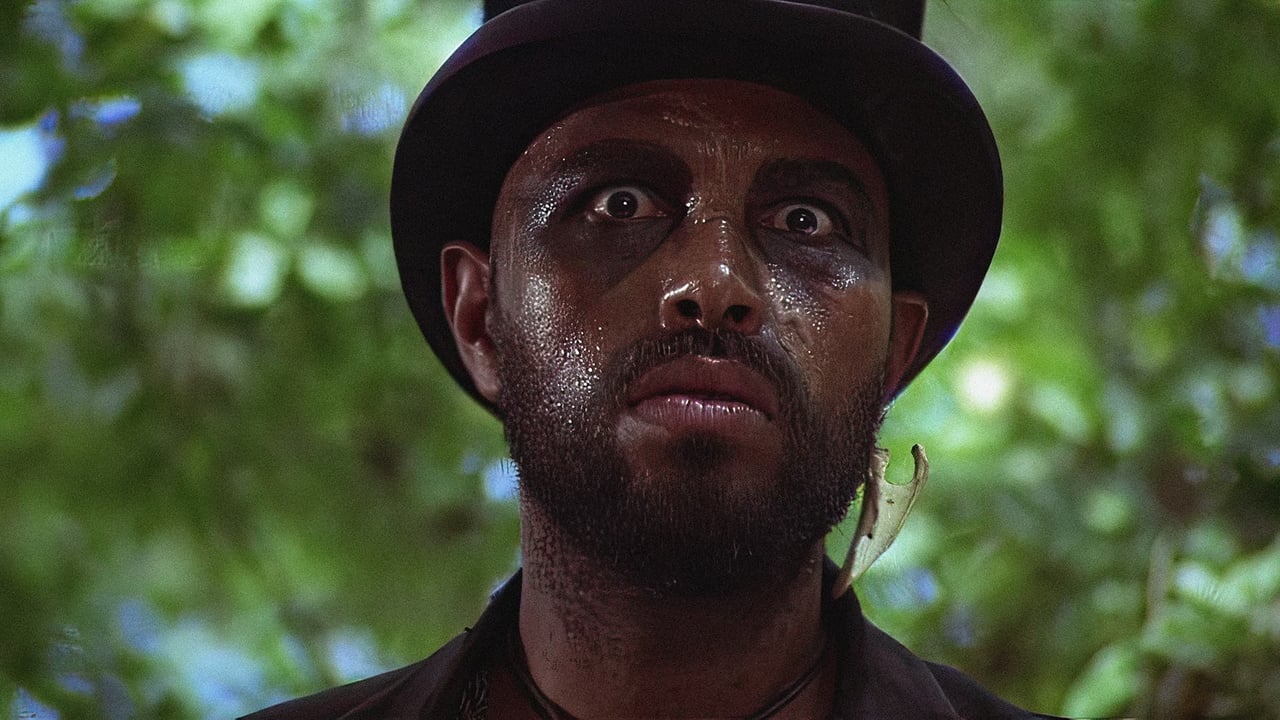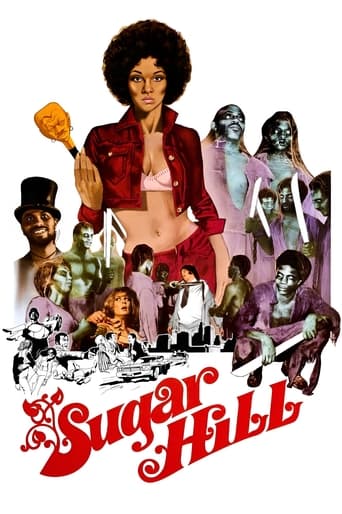



Strictly average movie
A waste of 90 minutes of my life
Watch something else. There are very few redeeming qualities to this film.
View MoreIt’s fine. It's literally the definition of a fine movie. You’ve seen it before, you know every beat and outcome before the characters even do. Only question is how much escapism you’re looking for.
View MoreWhen her boyfriend is brutally murdered, after refusing to be shaken down by the local gangsters running their protection racket, Sugar Hill (Marki Bey), decides to call upon the help of aged voodoo queen Mama Maitresse; Sugar entreats her to call upon Baron Zamedi, the Lord of the Dead, for help in gaining a gruesome revenge.Whether or not this is a blaxploitation horror film, I have no idea. There is definitely a theme of the black heroine (a poor man's Pam Grier) taking on white crooks. And the police detective has a pretty impressive fro going on. But the line between blaxploitation and a film that just happens to have black stars is a blurry one in the 1970s...What I do know is that this is a fun picture from Sam Arkoff and AIP. Not particularly scary and never taking itself too seriously, we get about half a dozen people attacked (one at a time) by a zombie horde. And these are real zombies -- the voodoo kind -- not those flesh-eating zombies that have taken over the horror world today.Not the best film, not the worst, but definitely one that probably gets overlooked too often and is worth a peek for those who are into the voodoo zombies and already saw the bigger name films like "White Zombie" or "Serpent and the Rainbow". I get the impression that this film was an influence on Adam Green's "Hatchet" series, though that may just be my imagination.Interestingly, despite being made after George Romero's "Night of the Living Dead", this film finds its roots more in the racially-inspired zombies of the 1940s and 1950s. Namely "King of the Zombies" (1941), "I Walked With a Zombie" (1943) and "Zombies of Mora Tau" (1957).
View MoreSugar Hill stars the delectable Marki Bey as Diana 'Sugar' Hill, foxy girlfriend of Langston, owner of the successful Club Haiti. When Langston is kicked to death by a gang of thugs for refusing to sell his business to greedy gangster Morgan (Robert Quarry), Sugar enlists the help of wizened voodoo priestess Mama Maitresse (Zara Cully) to avenge her man, summoning voodoo Lord of the Dead Baron Samedi (Don Pedro Colley) and an army of silver-eyed zombies to terrorise and kill those responsible.Directed by Paul Maslansky, producer of the Police Academy series, blaxploitation/zombie film Sugar Hill ain't exactly a 'classic' of either genre, lacking the grittiness to be found in many a blaxploitation movie and missing the outrageous gore of many a zombie flick. That said, the film is still plenty fun: the lovely Bey provides the eye candy, looking fab while wearing some truly funky outfits and switching her hairstyle back and forth from straightened to afro with ease; Colley is great hamming it up as Samedi, rolling his eyes and grinning malevolently in a variety of guises; there's a welcome cat fight between Sugar and trashy mob girl Celeste (Betty Anne Rees); the seventies fashions are hilarious (check out the scalloped lapels on Langston's sparkly jacket!); and who can't help but be entertained by the gloriously un-PC slurring from both sides? The dated racial insults fly thick and fast, making it unsurprising to find that a R2 release of this film has yet to happen.6.5 out of 10, rounded up to 7 for the disembodied chicken leg attack—you don't see that every day (unless you happen to watch this film every day, that is, which is unlikely).
View More1974's "Sugar Hill" marked the end of Robert Quarry's brief horror stardom beginning with 1970's "Count Yorga Vampire" (a total of 6 features), although he worked continuously in smaller roles in lower budgeted films. In the early 70's, AIP maintained its policy of old fashioned horror, all PG titles, even after the departure of James H. Nicholson, the ideas man, leaving Samuel Z. Arkoff, the financier and distributor, alone in charge. The 2 Count Yorga films were profitable, as were the Blaculas, and other black-themed takes on familiar subjects arrived, like this one here, plucked from obscurity (like "The House on Skull Mountain") by recent showings on Turner Classic Movies. Zombies and voodoo no longer go together in this age of flesh eating Romero copies, but provide all the intrigue in a script filled with clichéd characters and dialogue. Marki Bey stars in the title role, turning to voodoo to avenge the beating death of her fiancée by the hired goons of crime boss Morgan (Quarry), complete with Southern accent and horny moll (Betty Anne Rees, a prior victim in 1972's "Deathmaster"). Betty and Marki even engage in a catfight, ala Pam Grier, a nice touch considering neither would continue acting much longer. Richard Lawson ("Scream Blacula Scream") pads out the running time in a dead end investigation that fails to stop the bloodless carnage carried out by the walking dead, ancestral slaves still in shackles, lifeless eyes covered in creepy webs. Easily the real standout is Don Pedro Colley, a far cry from his restrained performance in 1970's "Beneath the Planet of the Apes," playing the role of Baron Samedi, leader of the dead, a part essayed one year before by Geoffrey Holder in the James Bond thriller "Live and Let Die." Among the supporting cast, the lone familiar face is top henchman Charles Robinson, who appeared in ROOTS:THE NEXT GENERATIONS, before landing a co-starring role on NIGHT COURT. Director Paul M. Maslansky was no stranger to horror, having first worked with Michael Reeves and Christopher Lee on 1964's "The Castle of the Living Dead," mostly as a producer. AIP continued to have hits for the remainder of the 70's ("The Food of the Gods," "The Amityville Horror"), but never really latched on to the genre's changes escalated by "The Exorcist," and by 1980, Sam Arkoff had sold out, the company renamed Filmways, continuing to churn out hits ("Dressed to Kill"). By that time, the blaxploitation era was already long gone, waiting to be rediscovered.
View More"Sugar Hill" has a lot of what made "Foxy Brown" so compelling, but adds an interesting plot device for a novel twist. I've seen lots of black gangster films where black heroes (and anti-heroes) get over on The Man and The Establishment, but "Sugar Hill" is the only film I've seen where horror monsters (as opposed to gun-play and car chases) are the vehicle for social justice. Of course, there could be others. I don't get out much. (And no, I don't count "Zombie Nightmare", which is a vanity project, not a movie.) The heroine of the story loses her man to the predations of the local Mob when the Mob moves in on their nightclub. In order to exact revenge, she manages to contact a local voodoo cult (because in this film's social milieu, all black people in the South maintain contact with their pagan cult roots, don'chaknow) and convince them to aid her cause. Hilarity ensues.On the plus side: the makeup effects for the zombies were novel and extremely effective - I've never seen any other film use 'brass eyes and cobwebs' effects and bluish "bad skin" tints like this. Someone did a wonderful job coaching the extras on how to be convincing as cold, soulless, remorseless, shambling piles of ex-humanity. And they are framed and filmed and lighted in setups out of your worst nightmares. The setups for each of the revenge scenes are well done, and there is a lot of variety in the scenarios, as well as some macabre humor - the 'death by massage therapy' scene managed to be both funny and appalling at the same time, which is a great trick. Also on the plus side: The actress playing Sugar is very striking and carries the movie effortlessly. She's convincingly merciless and cold as she delivers judgment on each of her foes, and obviously relishes her revenge. The actor playing Samedi seems familiar; I think he shilled for "7-Up" some years ago. He's got a wonderful, deep, rich patois that resonates in the viewers' solar plexus. His sadistic glee and delight in the suffering and terror he inspires in his prey is enough to make you seriously considering defecting to the ranks of the "voodoun." On the minus side: Once Sugar gets the voodoo revenge ball rolling, it's just too damned easy for her - there is no struggle, or suspense at all. In "Foxy Brown", the heroine suffers rape and beatings and humiliation before she turns the tide on her enemies, and it makes the story more compelling because of it. Even in a Jim Brown "Slaughter" film, Jim had to sweat some to win the day. For that matter, Bruce Lee took some serious hits in his various fights for justice and revenge. But here, the Mob guys are dumb as toast and go down before the voodoo onslaught like mice under a field mower.That turns the film from a heroic struggle to an exercise in righteous sadism against a bunch of mannequins.And traditionally in films and literature, if the protagonist messes with "Dark Forces" to exact their revenge, they have to pay a price themselves. But Samedi just goes out and tears Sugar's foes apart like an obedient supernatural Pit Bull and it doesn't cost her a thing, at least not overtly. The protagonist's desire for revenge and/or justice is much more convincing if the story shows them paying a real price to achieve it. So again, the film is less than it could be; instead of making Sugar Hill's story a tale of revenge no matter the cost, it becomes an plodding exercise in vicarious power fantasy and butt-kicking.But still, it's a powerful experience, if only due to the fortunate accident of the makeup and the charisma of the two lead black actors. I'm glad I managed to catch it on Showtime, and if I ever see it on DVD for a reasonable price, I'll probably pick it up for my collection.
View More